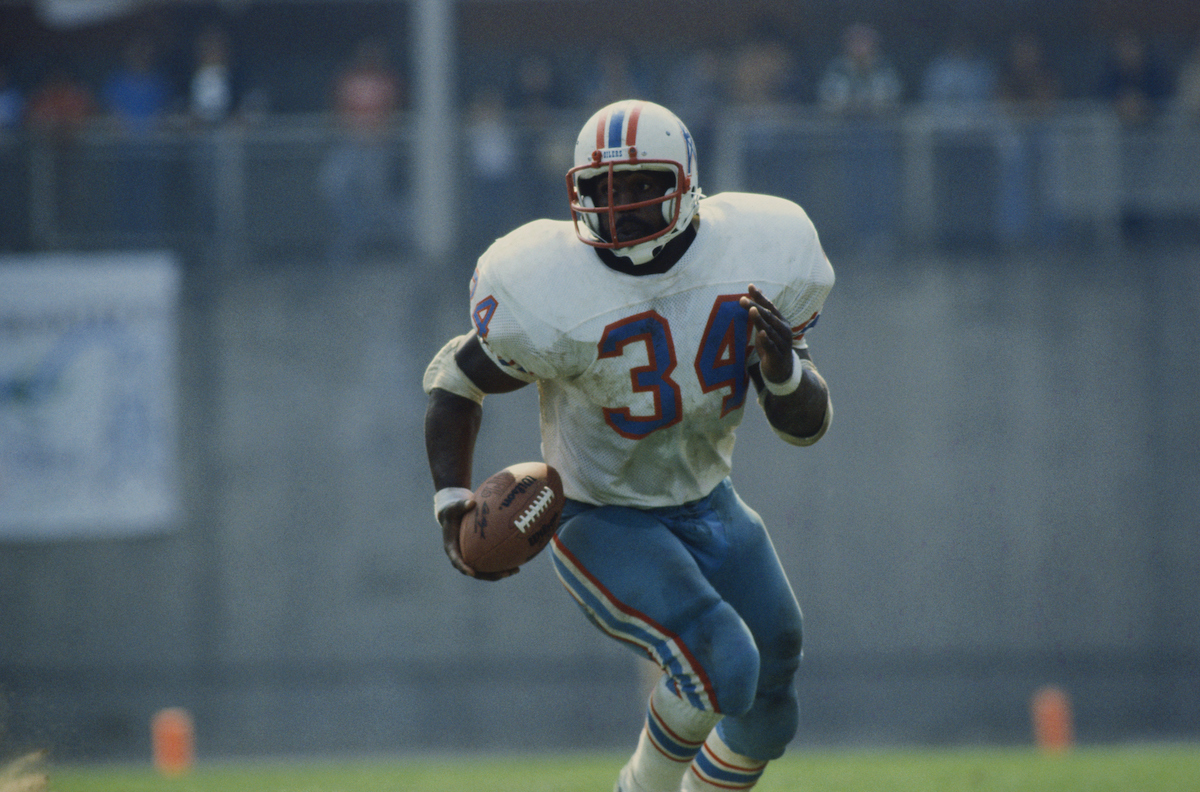NCAA
How the Legendary Earl Campbell Narrowly Dodged Paralysis in His Career

Earl Campbell was one of the most feared running backs in college with the Texas Longhorns and in the NFL with the Houston Oilers. Any defender who decided to tackle him did so at their own risk. However, those violent collisions that Campbell invited and became a trademark of his career came with a price.
Campbell has endured great pain since his playing days ended in 1985. In 1999, he was diagnosed with a spinal condition where doctors said it’s a miracle he was never paralyzed during his playing days, and by today’s medical standards, he would have never been allowed to play the game. He also became addicted to drugs popping 10 pills and a Budweiser a day to cope with the pain. Here’s a look back at Earl Campbell’s legendary career and how it was always one play away from ending tragically.
Earl Campbell stars for Texas Longhorns and in the NFL
RELATED: Sam Ehlinger and Texas Longhorns Have Confirmed Fans’ Worst Fears
Former Oklahoma University head coach Barry Switzer said in his book that Earl Campbell was a rarity and was good enough to play in the NFL when he arrived at the University of Texas. He was right, but Campbell waited, and for four seasons, he dominated the SWC.
During his time in Austin, he averaged 5.8 yards per carry. In 1977, his senior season, he averaged 6.5 yards, gained 1,744 yards, and won the first Heisman Trophy in Texas football history.
After the Houston Oilers selected Earl Campbell with the first pick of the 1978 NFL draft, he proved Switzer’s theory right and became a dominant force in the NFL his rookie year, when he rushed for a league-leading 1,450 yards, and scored 13 touchdowns. He was named the AP Rookie of the Year, AP Offensive Player of the Year, and was named to the All-Pro and Pro Bowl teams.
Earl Campbell’s condition and one hit could have left him paralyzed
RELATED: University of Texas Longhorn Athletes Demand Dumping School Song and Renaming Campus Buildings
Earl Campbell’s first three seasons in the NFL are still considered one of the most impressive periods for a running back in the game’s history. He led the NFL all three seasons in rushing, his high mark coming in 1980 when he rushed for a staggering 1,934 yards.
In 1979, Campbell was on the receiving end of a hit from Oakland Raiders safety Jack Tatum and it was the first indication something was seriously wrong. Tatum, who was known for his devastating hits, including one a year earlier that ended the career of Darryl Stingley and left him paralyzed, delivered a blow to Campbell that he never saw coming.
“The lick I took from Jack Tatum, that’s the only time I ever felt somebody hit me,” Campbell told ESPN. “A shock went down to the heels on my feet. And it burned. When I was standing on my head in my end zone, nobody knew this, but I was thinking, ‘Something’s wrong.'”
Campbell’s pain leads to addiction
RELATED: Vince Young Once Bought Every Seat on a Southwest Flight Just to Travel Alone
After years of playing the game like a battering ram, Earl Campbell was diagnosed with spinal stenosis, the same injury that ended Michael Irvin’s career. Campbell underwent the first of five back surgeries in 1999. On doctor’s recommendations, he started taking painkillers.
In 2008, Campbell’s former Houston Oilers coach Bum Phillips introduced him to his own spinal doctor, Stan Jones, who removed much of the hardware inserted in the previous surgeries that had become loose and caused pain touching his nerves. Jones told ESPN, after looking at the Tatum hit, Campbell is lucky.
“It is terrifying. It’s really dangerous. Earl probably had a contusion of the spinal cord at that time, which would explain the burning. He’s really lucky he was not injured severely with that hit, the way his head snaps back and then the way he falls. That’s a severe whiplash, which can cause spinal cord injury, especially with spinal stenosis.”
Fortunately, the surgery performed by Jones was the Hall of Famer’s last. Unfortunately, he was addicted to the painkillers. After a family intervention, Campbell checked into rehab. Today, he’s a member of Alcoholics Anonymous and speaks candidly about the dangers of painkillers and his own addiction.
Earl Campbell is a hero of Texas football. What he did on the football field is the stuff of legend. However, what he’s done since might not have garnered as much attention, but it’s more important as it has allowed Campbell to share his story and help change lives in the process.
Stats courtesy of Pro Football Reference.











